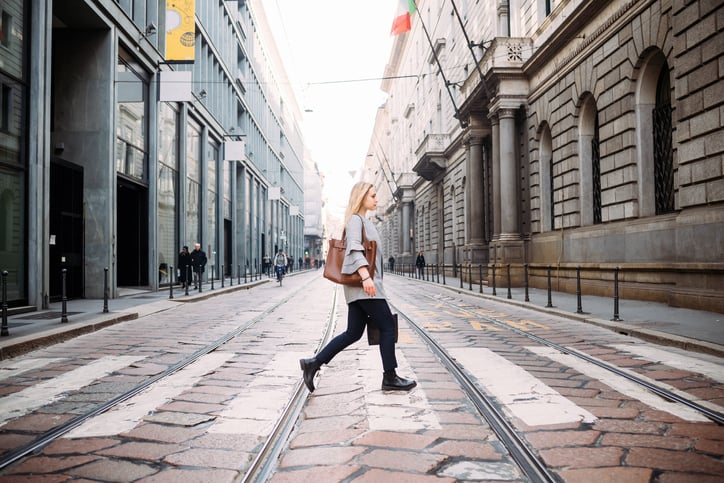- Home
- Exchange Students
Exchange Students
Each year quite a few students come from our partner universities to spend a term or a few weeks with us in Italy, getting immersed in the culture while continuing to study towards their future goals.
Are you one of our future Exchange Students? If you decide to do an exchange with us at POLIMI GSoM, you’ll get an invaluable and rewarding experience, both for short and long exchanges.
Delve deep into our vibrant culture and international environment in one of the most fascinating cities in the world. You’re incredibly valued here, because you contribute to the diversity of our classes, bringing valuable insights into your culture and helping to expand the personal and professional network that our students build during their experience at POLIMI GSoM.
Come onboard and take part in our Exchange Programs: we can’t wait to welcome you to Milan!

Your contact point
Our Program Office
Together with your home Institution, The Program Office is your main point of contact as an Exchange Student. Please have a chat with them for your calendar and academic details.
The International Student Office
The ISO is here to help you with tons of non-academic matters related to your stay. We can give you a hand with:
- Migration formalities for your stay in Italy
- Accommodationù
- Public transportation, banking, health cover in Italy, emergencies.
Your studies
The Italian Grading System and Credit System (ECTS)
Exams in Italy are graded using a scale of 30, where 18 is the minimum passing grade, and 30 cum laude is the highest you can get.
The Italian Grading System
- Excellent: 27/30 to 30 cum laude
- Good: 24/30 to 26/30
- Satisfactory: 21/30 to 23/30
- Barely passing: 18/30 to 20/30
- Fail: 0 to 17/30
Our Credit System
Both Italian and European universities use the European Credit Transfer System to evaluate the workload, teaching hours, and higher education outcome of every single course. Credits also measure the workload required to pass examinations, which includes your class attendance, group work, laboratory work and individual study.
One credit ends up being a workload of about 25 hours, and the yearly workload for an average study course is about 60 credits.
Go and talk with your home Institution to learn how many credits you’ll get for your exchange with us, and you can also find out about any other dispensation you might get.

Your Visa and Residence Permits
Get all the information you need about visa and permit of residency in the dedicate section!
Your pre-departure checklist
- Ask about visa requirements – we recommend contacting the Italian Consulate in your current country.
- If you need any supporting documents, just write to us and we’ll be happy to help.
- Arrange your accommodation
- Arrange health insurance for the duration of your stay
- Apply for your visa
- Budget for your stay
Important documents you’ll need to take with you
- A valid passport or European ID
- Your original admittance letter for your Exchange.
This needs to be stamped by the Italian Consulate at the same time as your visa was issued (this applies to you if you were required to enter Italy on a long stay visa)
- Private health insurance covering you in the entire Schengen area for the whole period of your stay. If you’re a non-EU student entering Italy on a long stay visa, you need to show an insurance document written in English or Italia
- Your European health card – this is for European residents only
- 3 passport-sized photographs
- €102 cash for your permit of stay application (this is just for non-EU students holding a long stay visa)
- Any medication and relevant medical documentation that you might need (this is for your safety only)
Health Insurance
Your health is important to us. So it’s important to have adequate health cover for your entire stay in Italy, especially if you need to get a residence permit.
EMERGENCY NUMBERS
- Ambulance: 112
- After-hours on-call doctor: 116 117
You should:
- Get health insurance from a reputable international or national provider. This health insurance should cover you for the entire duration of your stay in Milan.
- Provide proof of health insurance if it’s one of the necessary steps for your visa.
- Make sure your private insurance meets the criteria for your residence permit application (this is only if you’re staying for more than 90 days). It needs to cover you for the entire period of your visa or intended stay, needs to cover you in the entire Schengen Area, and you need to make sure the insurance policy is written in English or Italian.
- Bring any relevant prescriptions or medical equipment/information that might be important for your personal medical needs. This is just for peace of mind because it can come in handy in the event of illness or injury. We won’t ever ask you for these types of documents at the school.

Accommodation
Don’t forget to check out our Accommodation Webpage for more information.
If you’re a short-term student, you have the option of booking accommodation through one of our agreed accommodation providers. Just chat to the ISO for the list of available accommodation options.
Money matters
You should make financial arrangements before you get here – ideally you should be able to cover all your living and accommodation costs for the length of your stay.
Milan is more expensive than smaller cities in Italy or Europe but it’s still less expensive than most big European cities.
Our current students have budgeted around €1,000 per month to stay in Milan.
Important information
You should be aware that you can’t make cash payments of more than €2,000. But don’t worry! You can get by with cards or bank transfers. Please take note that foreign cheques are really hard to change, and travellers’ cheques are hardly accepted anywhere.
Credit cards are widely accepted at tons of businesses and shops, except for government buildings and very small retailers, which usually only accept cash.
STUDENT LIFE
Check out the info here to get an idea of how to move around the city and just generally make the most of your time with us in Milan.

Dress code
Feel free to dress in smart casual for your daily classes, but take it up a notch and wear formal attire for business seminars and meetings with companies.

